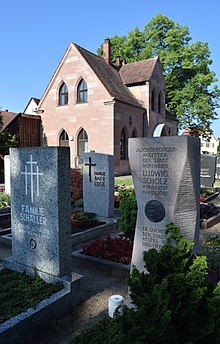Ludwig Scholz

Ludwig Scholz (* the thirtieth June 1937 in Juliusburg , District Oels , Lower Silesia ; † 20th September 2005 in Nuremberg , Bavaria ) was a German politician of the CSU and Lord Mayor of Nuremberg .
Life
Scholz was born in Juliusburg in Silesia . He passed the Abitur in Limburg ad Lahn and studied law and economics in Frankfurt am Main , Marburg and Heidelberg . After taking the state examinations in law, in 1967 he became assessor at the Federal Office for the Recognition of Foreign Refugees in Zirndorf , government councilor at the Hersbruck district office (now part of the Nürnberger Land district ) and senior councilor at the Fürth district office . Before his election as Lord Mayor, he was Senior Government Director at the State Investigation Office for the Health Care System in Northern Bavaria (since 2002: Bavarian State Office for Health and Food Safety) in Erlangen.
Ludwig Scholz was a member of the Nuremberg City Council from 1972 until his death. From 1988 to 1996 he was also the parliamentary group leader of the CSU city council. In 1996 he surprisingly won the runoff election for mayor against incumbent Peter Schönlein ( SPD ). In the local elections in 2002 he lost to the challenger Ulrich Maly (SPD) in the runoff election . Scholz was the first Lord Mayor of Nuremberg to belong to the CSU. He was also the first Catholic incumbent in Nuremberg since the Reformation.
From 1996 to 2002 he was a member of the jury for the International Nuremberg Human Rights Award .
One of his concerns, with which Scholz had already campaigned, was the closure of the self-administered culture house KOMM , which the CSU saw as a “breeding ground for terrorists and squatters” according to Spiegel.
Ludwig Scholz played a major role in the fact that Nuremberg was designated as the venue for the 2006 World Cup. He also made a major contribution to the 2001 ice hockey world championship taking place in Nuremberg. In 2000, the 950th anniversary of the city of Nuremberg was committed under his aegis that from taking place as major events annually Blue night , the Classic Open Air and the city's founding Kommersbuch emerged. Ludwig Scholz has achieved particular merits by campaigning for the establishment of a nationwide unique museum, the Documentation Center of the Nazi Party Rally Grounds . In addition, Ludwig Scholz u. a. for town twinning, more efficient administration and sport.
Scholz was married and had three children and six grandchildren. He died unexpectedly on September 20, 2005 (probably) of the consequences of a heart attack and was buried on September 23 in the Nuremberg-Eibach cemetery.
The Ludwig Scholz Bridge over the Main-Danube Canal , not far from his last residence, has been named in his honor since 2009 .
Scholz was a member of the Catholic student associations WKStV Guestfalia-Sigfridia Frankfurt, WKStV Unitas Franko-Saxonia Marburg, WkStV Unitas Kurpfalz Heidelberg and WKStV Franko-Palatia Nürnberg-Erlangen.
Award
- 1992: Federal Cross of Merit on ribbon
- 1997: Capo Circeo Prize
- 1999: Municipal Medal of Merit in Silver
- 1999: Honorary citizen of the city of Shenzhen (since May 1997 twin town of the Nuremberg region)
- 2000: Bavarian Order of Beer
- 2002: Federal Cross of Merit, 1st class
literature
- Alexandra Foghammar: Mourning Ludwig Scholz. On the death of the former mayor . Photos: Christine Dierenbach. In: Nürnberg Heute magazine No. 79, 2nd half of 2005, pp. 28–31 - PDF
Web links
- Obituary for the death of Ludwig Scholz on the website of the city of Nuremberg
- Inauguration of the Ludwig Scholz Bridge
- Photo by Ludwig Scholz at Nordbayern.de
Individual evidence
| personal data | |
|---|---|
| SURNAME | Scholz, Ludwig |
| BRIEF DESCRIPTION | German politician (CSU) |
| DATE OF BIRTH | June 30, 1937 |
| PLACE OF BIRTH | Juliusburg , Silesia |
| DATE OF DEATH | September 20, 2005 |
| Place of death | Nuremberg , Bavaria |

